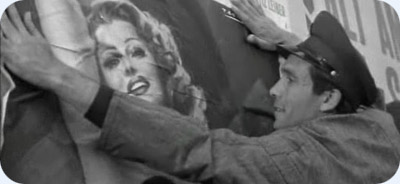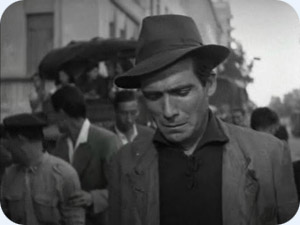Bicycle Thieves

Italy, 1948, "Ladri di biciclette" Dir: Vittorio De Sica, Production: Produzioni De Sica, Story: Cesare Zavanttini, Oreste Biancoli, Suso Cecchi D'Amico, Adolfo Franci, Gherardo Gherardi, Vittorio De Sica and Ferardo Guerrieri, following the novel of Luigi Bartolini, adapted by Cesare Zavanttini. Photography: Carlo Montuori. Artistic Direction: Antionio Traverso, Music: Alessandro Cicognini, Edition: Eraldo Da Roma. Duration: 90 min.

Bicycle Thieves tells the story of a father and son walking the streets of Rome for a bicycle. Antonio is a dessperate man who's means of work is stolen in his first day of job after a long unemployment. His son, Bruno, who renounced his childhood for working in a gas station helps him.
The story is an insight of desesperation in the middle of total indiference by the people who surround them, everybody has problems to deal with; "it's nothing, just a stolen bicycle" says a comissar at the police station, the only ones interested at the begining were helping the thief. The movie ends with both father and son, defeated, walking ahead with everyone. They aren't special.
The relation between father and son is represented very subtly. Antonio can't take the role of the father in his desperate position, and knows it. Bruno learns that he has to learn to take care of his father.
The story is an insight of desesperation in the middle of total indiference by the people who surround them, everybody has problems to deal with; "it's nothing, just a stolen bicycle" says a comissar at the police station, the only ones interested at the begining were helping the thief. The movie ends with both father and son, defeated, walking ahead with everyone. They aren't special.
The relation between father and son is represented very subtly. Antonio can't take the role of the father in his desperate position, and knows it. Bruno learns that he has to learn to take care of his father.

At the end of WWII, when Italy was virtually in ruins, artist weren't in the mood for making idealized stories where everything ends well. The Cinecittà, the Italian movie studios founded by Mussolini was destroyed. Filmmakers wanted to show the reality, without any romantic representations; De Sica, Rosselini, Antonioni, Pasolini, Visconti and Fellini, to name the most representatives, started to do so. Filming realistic stories in the city without actors and without any romantic licence (Visconti was the exception), this was the Italian neorrealism. The most influantial movement in film history. this movie is regarded as its peak moment.
The actor who plays Antonio was also an unemployed factory worker, as well as many of the actors. Antonio is hanging a Poster of Rita Hayworth in Gilda, an evasion of reality that emphasizes the realism of the picture. You are not watching "a movie", it's something real.
De Sica had big dificulties for financing the film, one producer was ready to finance it only if it starred Cary Grant. When the movie came out at Christmas of 1948 it was a complete failure, it isn't a Christmas movie. It also recieved bad reviews from the Italian press, but not in Paris, England or in the USA, where it even recieved a special Oscar. After its big success, it was well recieved again in Italy.
Vittorio De Sica is one of the world's greatest filmmakers. Before being a neorrealist director he was a charismatic actor of romantic movies. His father stopped him for being an accountant for going to showbiz. He was very influenced by Chaplin and represented emotions in a similar way. Also usually shows the childrens' emotional point of view, he is a director of emotions, achieving true, powerful simplicity, making the camera dissapear and making us become part of his movies.
Please post your comment.




1 Comments:
At 6:02 PM, Ronen said…
Ronen said…
Before any questions about the title of the movie:
The title in english is The Bicycle Thief, in singular, but in Italian is Ladri di biciclette, in plural.
I like much more the original name, since it implies that there is not only one thief, the are more, even Antonio, maybe all of us.
A title can change the meaning of a movie.
Post a Comment
<< Home